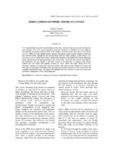| dc.contributor.author | Habib, Mushira | |
| dc.date.accessioned | 2014-04-05T18:12:23Z | |
| dc.date.available | 2014-04-05T18:12:23Z | |
| dc.date.issued | 2013 | |
| dc.identifier.uri | http://hdl.handle.net/10361/3154 | |
| dc.description.abstract | 9/11 has redefined the world’s understanding of the term ‘terrorism’ and its association with power and resistance. Post 9/11 novels attempt to represent terrorism or rebellions in a new light by investigating the psycho-social positions of the subjects involved in any such cause or movement. Terrorist (2006) by John Updike portrays Ahmad’s desperate journey towards religious extremism and eventual return brought by his reconciliation with his inner conflicts. Kiran Desai’s The Inheritance of Loss (2006) shows Gyan’s inferiorities that lead to the Gurkha Movement, failing his heroic aspirations and bringing him back to his social reality. Thus both these novels shed light on the individuals that get tangled in the false visions of revolutionary or utopian achievements without any real insight and empathy towards the cause. Hence this paper brings these two characters together to analyse their personal conflicts that ignite deviant tendencies in them and their turn to conformity, reaffirming their ignorant and powerless positions in the society that had originally initiated their rage. This paper thus highlights how the ‘terrorists’ in these two novels end up with an ‘inheritance of loss’ and nothing else. | en_US |
| dc.language.iso | en | en_US |
| dc.publisher | BRAC University | en_US |
| dc.relation.ispartofseries | BRAC University Journal, BRAC University;Vol. 10, No. 1 & 2, 2013, p. 49-54 | |
| dc.subject | 9/11 | en_US |
| dc.subject | Terrorism | en_US |
| dc.subject | Extremism | en_US |
| dc.subject | Gurkha movement | en_US |
| dc.subject | Identity | en_US |
| dc.title | Rebels through updike and desai's lenses | en_US |
| dc.type | Article | en_US |

